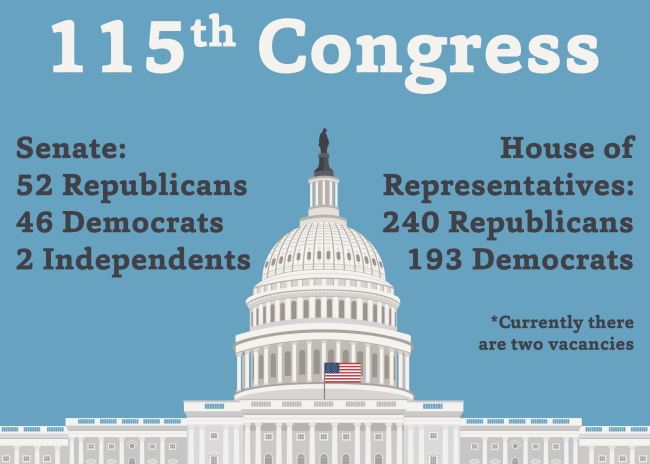Advocacy Update: DeVos Confirmation Moves Forward
NAESP is deeply concerned about the nominee’s ability to hold the nation’s highest education office and uphold the interest of public education.
By Kelly D. Pollitt
Communicator
January 2017, Volume 40, Issue 5

After last week’s Senate Committee on Health, Education, Labor, and Pensions (HELP) confirmation hearing for Trump Administration nominee for U.S. Secretary of Education, Betsy DeVos, NAESP is deeply concerned about her level of experience in education and ability to hold the nation’s highest education office and uphold the interest of public education.
Prior to the confirmation hearing, DeVos indicated her priorities as education secretary would be local control, listening to parents, and school choice. But those comments as well as her performance at the January 17 hearing became very troublesome considering her long history of advocacy in states on voucher programs that redirected public education funding to private schools—with little to no accountability. During the course of the confirmation hearing, a range of important topics in education were covered, including early learning, special education, measures of school performance, career and technical education, campus sexual assault, and school choice. However, DeVos offered no insights on her vision for addressing these key areas and refused to comment on any specific policy actions she would take as secretary. From voucher programs that may divert public funds to private schools without any transparency and accountability to a lack of understanding of critical special education law to a perspective that implies guns have a rightful place in schools, NAESP is alarmed by the nominee’s lack of experience, credibility, and commitment to focus on investing in and strengthening the nation’s public schools to ensure that a high-quality public school is available for every student.
This conclusion was reached not necessarily by what the nominee supported, but the lack of response to key questions posed by lawmakers. DeVos failed to affirm a commitment to our nation’s schools or provide any vision to support what we know students need to be successful.
On School Choice: DeVos said she supports a mix of strong public and private schools and hopes that Congress will lead the way with legislative proposals. She signaled support for uniform traditional public school and charter accountability requirements—but did not commit to a similar approach for private schools accepting publicly funded voucher students. Sen. Lamar Alexander (R-TN), Chairman of the HELP Committee, indicated he is interested in revisiting several voucher “scholarship” proposals, including Title I portability, which were introduced in the last Congress but did not pass. DeVos expressed intent to work with Congress on such proposals, but did state that she would not impose choice on states.
On Special Education: DeVos showed a surprising lack of knowledge about the Individuals with Disabilities Education Act (IDEA) and the key tenets of the federal civil rights law that ensures children with disabilities must have access to a free and appropriate public education. She failed to commit that she would ensure students with disabilities would not have to relinquish their rights under IDEA in a hypothetical voucher-based model, or if private schools serving voucher students should be obligated to comply with IDEA. DeVos responded that she is “sensitive” to the needs of special education students, but the issue should be left to state and local decision-making, later admitting to “confusing” the law.
On Early Learning: DeVos gave little to no acknowledgement that she would support an early learning agenda or seek to support the needs of students from grades pre-K-3, a key priority for NAESP.
On Measuring School Performance: In a flailing Q&A exchange with Senator Al Franken (D-MN), the nominee seemed to not understand the difference between student proficiency and growth. Although ESSA limits the Secretary’s role in such matters, this stumble clearly showed her lack of knowledge and experience in order to serve as the nation’s highest education official.
On Conditions for Learning and School Safety: Guns in schools became a notable topic when, in response to Sen. Christopher Murphy (D-CT), DeVos asserted that the decision about guns should be left to states and localities. She cited a conversation with Sen. Michael Enzi (R-WY) about a Wyoming school with a Grizzly bear fence that might benefit from having a gun to defend students from wildlife. NAESP does not support guns in schools, for any reason.
These responses and lack of educational experience leave NAESP deeply concerned about the nominee’s ability to direct federal education policy that prioritizes a consistent, high-quality, safe and supportive educational opportunity for all students. We believe any Secretary of Education must fully commit to supporting and strengthening the nation’s public schools so that they may meet student learning needs in a safe environment. Further, NAESP believes that any entity receiving public dollars should be held to the same accountability, transparency, and reporting requirements as regular public schools—without question or negotiation.
As the Senate HELP Committee moves to vote on her nomination January 31, NAESP plans to be on the record voicing the many concerns, even though Republicans likely will move ahead with DeVos’ full approval.
NAESP is monitoring the nomination process and any new proposals that impact the interests of elementary and middle-level principals. We will continue to advocate for strong public schools to secure America’s future. For more information about NAESP’s 2017 advocacy agenda, please contact Kelly D. Pollitt, Chief Strategist, Policy and Alliances, at kpollitt@naesp.org.
—
Copyright © 2017. National Association of Elementary School Principals. No part of the articles in NAESP magazines, newsletters, or website may be reproduced in any medium without the permission of the National Association of Elementary School Principals. For more information, view NAESP’s reprint policy.

